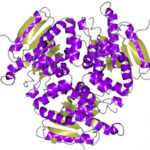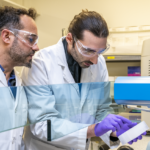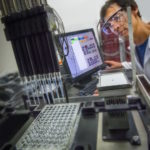The Advanced Light Source hit a structural biology milestone in May 2018 with the help of their eight structural biology beamlines. Users of these beamlines have now collectively deposited over 7000 proteins into the Protein Data Bank (PDB), a worldwide, open-access repository of protein structures. The 7000th ALS protein structure (PBD accession number 6C7C) is an enzyme from Mycobacterium ulcerans (strain Agy99), solved with data from Beamline 5.0.2 in the Berkeley Center for Structural Biology. The enzyme is of interest to the researchers from the Seattle Structural Genomics Center for Infectious Disease (SSGID), whose mission is to obtain crystal structures of potential drug targets on the priority pathogen list of the National Institute of Allergy and Infectious Diseases (NIAID). Beamline 5.0.2, the first protein crystallography beamline at the ALS, came online in 1997. Read more in the ALS Feature.
New Machine Learning Approach Could Accelerate Bioengineering
Héctor García Martin and Zak Costello, scientists affiliated with the DOE Agile BioFoundry, the Joint BioEnergy Institute (JBEI), and the Biological Systems and Engineering Division have developed a way to use machine learning to dramatically accelerate the design of microbes that produce biofuel.
Their computer algorithm starts with abundant data about the proteins and metabolites in a biofuel-producing microbial pathway, but no information about how the pathway actually works. It then uses data from previous experiments to learn how the pathway will behave. The scientists used the technique to automatically predict the amount of biofuel produced by pathways that have been added to E. coli bacterial cells. The research is published online in Nature Partner Journal Systems Biology and Applications. Read the Berkeley Lab News Center feature story.
JGI Helps Identify Novel Archaeal Lineage found in Yellowstone
For decades, longtime JGI collaborator Bill Inskeep of Montana State University has been conducting microbial field studies at Yellowstone National Park. In Nature Microbiology, he and his team describe a candidate phylum-level lineage of aerobic archaea found in iron-oxide microbial mats dubbed Marsarchaeota. Through the JGI’s Community Science Program, the team used metagenome assemblies, transcriptomes and single amplified genomes from samples collected from several locations to thoroughly characterize the archaeal lineage, information that they believe will lend insights into discussions on the origin of archaea. The discovery of aerobic, thermophilic Marsarchaeota in these microbial mats provides the team with clues on how early life evolved on Earth as iron is believed to have played a key role in redox processes important in the formation and evolution of early life on Earth. Read the whole story on the JGI website.
CinderBio Founders Among New Cohort of Cyclotron Road Fellows
Jill Fuss and Steve Yannone, both research scientists in Molecular Biophysics and Integrated Bioimaging (MBIB), are among the 13 scientists and engineers who comprise the fourth cohort of Cyclotron Road fellows. The pair co-founded CinderBio, a spin-out company that uses extremophile microbes to produce industrial enzymes that can withstand very high temperatures and acidic environments.
New Workflow Accelerates Experiment-based Gene Function Assignment
While advances in sequencing technologies have enabled researchers to access the genomes of thousands of microbes and make them publicly available, the task of assigning functions to the genes uncovered has lagged behind due to the limited capacity of functional analysis approaches. To help overcome this bottleneck, Berkeley Lab researchers, led by Adam Arkin and Adam Deutschbauer in Biosciences’ Environmental Genomics and Systems Biology (EGSB) Division and Matthew Blow at the DOE Joint Genome Institute (JGI), have developed a workflow that enables large-scale, genome-wide assays of gene importance across many conditions.
- « Previous Page
- 1
- …
- 122
- 123
- 124
- 125
- 126
- …
- 214
- Next Page »
Was this page useful?








